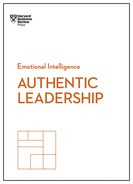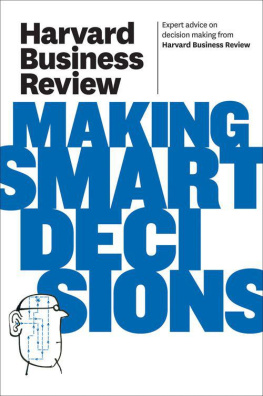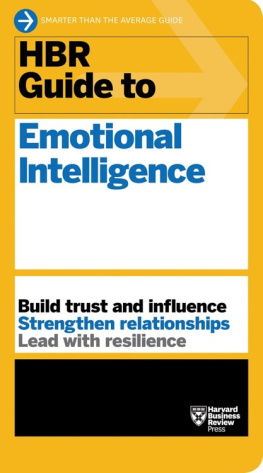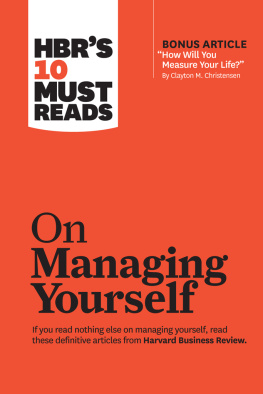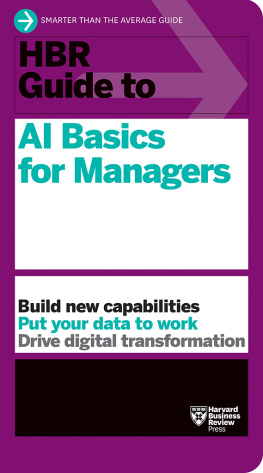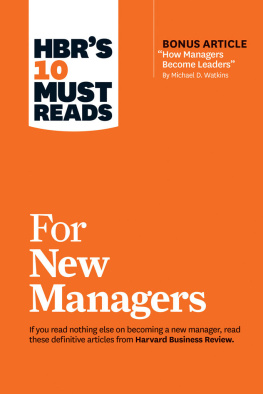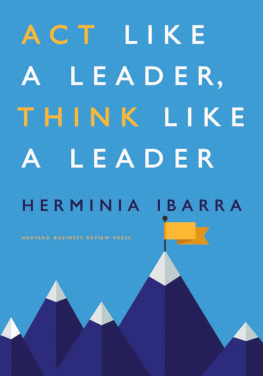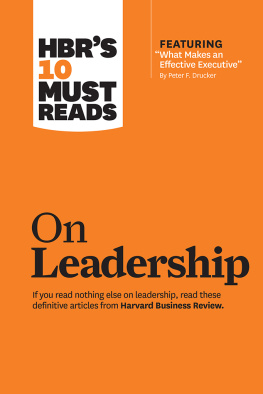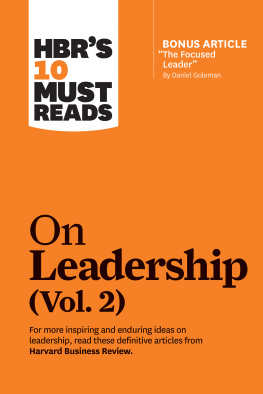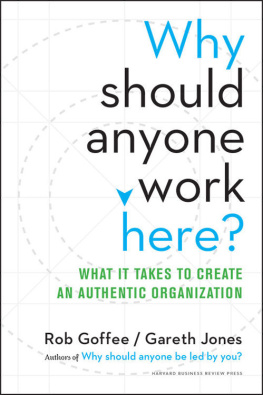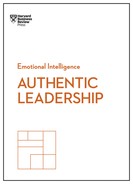1
Discovering Your Authentic Leadership
By Bill George, Peter Sims, Andrew N. McLean, and Diana Mayer
During the past 50 years, leadership scholars have conducted more than 1,000 studies in an attempt to determine the definitive styles, characteristics, or personality traits of great leaders. None of these studies has produced a clear profile of the ideal leader. Thank goodness. If scholars had produced a cookie-cutter leadership style, individuals would be forever trying to imitate it. They would make themselves into personae, not people, and others would see through them immediately.
No one can be authentic by trying to imitate someone else. You can learn from others experiences, but there is no way you can be successful when you are trying to be like them. People trust you when you are genuine and authentic, not a replica of someone else. Amgen CEO and president Kevin Sharer, who gained priceless experience working as Jack Welchs assistant in the 1980s, saw the downside of GEs cult of personality in those days. Everyone wanted to be like Jack, he explains. Leadership has many voices. You need to be who you are, not try to emulate somebody else.
Over the past five years, people have developed a deep distrust of leaders. It is increasingly evident that we need a new kind of business leader in the 21st century. In 2003, Bill Georges book, Authentic Leadership: Rediscovering the Secrets to Creating Lasting Value, challenged a new generation to lead authentically. Authentic leaders demonstrate a passion for their purpose, practice their values consistently, and lead with their hearts as well as their heads. They establish long-term, meaningful relationships and have the self-discipline to get results. They know who they are.
Many readers of Authentic Leadership, including several CEOs, indicated that they had a tremendous desire to become authentic leaders and wanted to know how. As a result, our research team set out to answer the question, How can people become and remain authentic leaders? We interviewed 125 leaders to learn how they developed their leadership abilities. These interviews constitute the largest in-depth study of leadership development ever under taken. Our interviewees discussed openly and honestly how they realized their potential and candidly shared their life stories, personal struggles, failures, and triumphs.
The people we talked with ranged in age from 23 to 93, with no fewer than 15 per decade. They were chosen based on their reputations for authenticity and effectiveness as leaders, as well as our personal knowledge of them. We also solicited recommendations from other leaders and academics. The resulting group includes women and men from a diverse array of racial, religious, and socioeconomic backgrounds and nationalities. Half of them are CEOs, and the other half comprises a range of profit and nonprofit leaders, midcareer leaders, and young leaders just starting on their journeys.
After interviewing these individuals, we believe we understand why more than 1,000 studies have not produced a profile of an ideal leader. Analyzing 3,000 pages of transcripts, our team was startled to see that these people did not identify any universal characteristics, traits, skills, or styles that led to their success. Rather, their leadership emerged from their life stories. Consciously and subconsciously, they were constantly testing themselves through real-world experiences and reframing their life stories to understand who they were at their core. In doing so, they discovered the purpose of their leadership and learned that being authentic made them more effective.
These findings are extremely encouraging: You do not have to be born with specific characteristics or traits of a leader. You do not have to wait for a tap on the shoulder. You do not have to be at the top of your organization. Instead, you can discover your potential right now. As one of our interviewees, Young & Rubicam chairman and CEO Ann Fudge, said, All of us have the spark of leadership in us, whether it is in business, in government, or as a nonprofit volunteer. The challenge is to understand ourselves well enough to discover where we can use our leadership gifts to serve others.
Discovering your authentic leadership requires a commitment to developing yourself. Like musicians and athletes, you must devote yourself to a lifetime of realizing your potential. Most people Kroger CEO David Dillon has seen become good leaders were self-taught. Dillon said, The advice I give to individuals in our company is not to expect the company to hand you a development plan. You need to take responsibility for developing yourself.
In the following pages, we draw upon lessons from our interviews to describe how people become authentic leaders. First and most important, they frame their life stories in ways that allow them to see themselves not as passive observers of their lives but rather as individuals who can develop self-awareness from their experiences. Authentic leaders act on that awareness by practicing their values and principles, sometimes at substantial risk to themselves. They are careful to balance their motivations so that they are driven by these inner values as much as by a desire for external rewards or recognition. Authentic leaders also keep a strong support team around them, ensuring that they live integrated, grounded lives.
Learning from your life story
The journey to authentic leadership begins with understanding the story of your life. Your life story provides the context for your experiences, and through it, you can find the inspiration to make an impact in the world. As the novelist John Barth once wrote, The story of your life is not your life. It is your story. In other words, it is your personal narrative that matters, not the mere facts of your life. Your life narrative is like a permanent recording playing in your head. Over and over, you replay the events and personal interactions that are important to your life, attempting to make sense of them to find your place in the world.
While the life stories of authentic leaders cover the full spectrum of experiencesincluding the positive impact of parents, athletic coaches, teachers, and mentorsmany leaders reported that their motivation came from a difficult experience in their lives. They described the transformative effects of the loss of a job; personal illness; the untimely death of a close friend or relative; and feelings of being excluded, discriminated against, and rejected by peers. Rather than seeing themselves as victims, though, authentic leaders used these formative experiences to give meaning to their lives. They reframed these events to rise above their challenges and to discover their passion to lead.
Lets focus now on one leader in particular, Novartis chairman and CEO Daniel Vasella, whose life story was one of the most difficult of all the people we interviewed. He emerged from extreme challenges in his youth to reach the pinnacle of the global pharmaceutical industry, a trajectory that illustrates the trials many leaders have to go through on their journeys to authentic leadership.
Vasella was born in 1953 to a modest family in Fribourg, Switzerland. His early years were filled with medical problems that stoked his passion to become a physician. His first recollections were of a hospital where he was admitted at age four when he suffered from food poisoning. Falling ill with asthma at age five, he was sent alone to the mountains of eastern Switzerland for two summers. He found the four-month separations from his parents especially difficult because his caretaker had an alcohol problem and was unresponsive to his needs.

